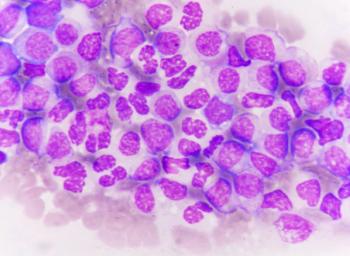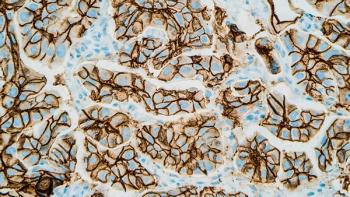
A phase 2 study evaluated the efficacy of balstilimab and botensilimab in patients with MSS metastatic mCRC without liver metastases.

Your AI-Trained Oncology Knowledge Connection!


A phase 2 study evaluated the efficacy of balstilimab and botensilimab in patients with MSS metastatic mCRC without liver metastases.

Cohort 5 of the ongoing phase 1/2 GOBLET study evaluated the safety of pelareorep in combination with modified FOLFIRINOX with or without atezolizumab in patients with newly diagnosed metastatic pancreatic ductal adenocarcinoma.

Anito-cel produced no delayed or non–immune effector cell–associated neurotoxicity syndrome among patients with multiple myeloma.

An isatuximab-based quadruplet yields significant long-term benefits regardless of subsequent maintenance in in patients with transplant-eligible NDMM.

The phase 3 CamRelief study reported a pathologic complete response rate of 56.8% for camrelizumab plus chemo compared with 44.7% for chemo alone.

Elascestrant with abemaciclib elicited an overall response rate of 18% in ER+/HER2– Breast Cancer, results from the 2 trials show.

For patients with HMA–naive chronic myelomonocytic leukemia, an IO-202 combo demonstrated durable responses, a phase 1b study found.

For patients with HR–positive/HER2-negative breast cancer, neoadjuvant patritumab deruxtecan with or without letrozole showed antitumor activity.

Findings from DREAMM-7 support belantamab mafodotin plus bortezomib and dexamethasone as a standard of care in relapsed/refractory multiple myeloma.

For patients with relapsed or refractory diffuse large B-cell lymphoma in the US, tafasitamab elicited promising real-world efficacy outcomes.

Treatment with vorasidenib also confers better seizure control than placebo in the phase 3 INDIGO study.

Data from the SunRISe-4 trial demonstrate the benefit of adding TAR-200 to checkpoint inhibition among patients with muscle-invasive bladder cancer.

Pembrolizumab combination improved efficacy outcomes vs chemoradiotherapy alone in patients with advanced cervical cancer.

Data from the GALAXIES-Lung 201 trial found efficacy improvement in patients with advanced NSCLC.

Findings from DESTINY-Breast12 support the use of T-DXd for patients with HER2-positive metastatic breast cancer.

BMS-986012 in combination with nivolumab/chemotherapy showed numerical PFS improvements in those with and without brain metastases at baseline.

Phase 1/2 data highlight the benefit of linvoseltamab even among prespecified high-risk patient subgroups with relapsed/refractory multiple myeloma.

Data from STARGLO showed that fixed-duration glofitamab-gxbm (Columvi) plus gemcitabine/oxaliplatin significantly improved survival compared with rituximab (Rituxan) plus gemcitabine/oxaliplatin in select patients with relapsed/refractory diffuse large B-cell lymphoma.

Blinatumomab demonstrated “impressive activity” in the ALLTogether1 DS study, according to Sujith Samarasinghe, BSc, MBBS, MRCPCH, FRCPath, PhD.

Phase 2 data may support petosemtamab as a best-in-class treatment for frontline HNSCC, according to Jérôme Fayette, MD.

The CheckMate 816 trial reinforced the EFS data of nivolumab plus chemotherapy in resectable NSCLC.

A trend towards improved progression-free survival was not noted when pembrolizumab plus sacituzumab govitecan was used to treat patients with HR+ breast cancer.

Data from the ADRIATIC trial show consistent PFS and OS benefits with durvalumab across predefined limited-stage small cell lung cancer subgroups.

Increased PFS was noted with abemaciclib plus fulvestrant vs fulvestrant alone in hormone receptor–positive, HER2-negative advanced breast cancer after disease progression on a CDK4/6 inhibitor and endocrine therapy.

A reduction in splenomegaly was observed when the combination of pelabresib plus ruxolitinib was used to treat patients with myelofibrosis.

Ponatinib remains a safe treatment for patients with chronic-phase chronic myeloid leukemia.

Investigators also look to assess linvoseltamab in relapsed/refractory multiple myeloma as part of the phase 3 LINKER-MM3 trial.

A 50% objective response rate was observed when becotarug plus osimertinnib was combined to treat patients with EGFR exon 12 non–small cell lung cancer.

Several patients with TP53 Y220C–mutated ovarian cancer experience tumor shrinkage following treatment with rezatapopt in the phase 1/2 PYNNACLE study.

Findings from the phase 1/2 TRANSCEND CLL 004 trial support lisocabtagene maraleucel as a potential new treatment option for relapsed/refractory chronic lymphocytic leukemia or small lymphocytic lymphoma.